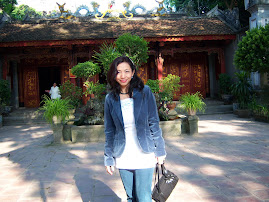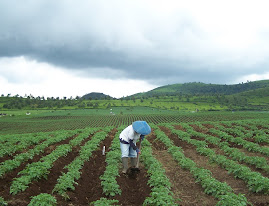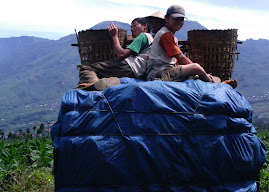Idha Widi Arsanti
Researcher in Agricultural Economic
Born: 14th of January, 1973
Birthplace:
Nationality: Indonesian
Researcher in Agricultural Economic
Born: 14th of January, 1973
Birthplace:
Nationality: Indonesian
Analysis of Seed Production and Marketing Strategy: Case Study in Perum Sang Hyang Seri, Seed Production Unit Klaten II.
Benchmarking Analysis of Handicraft Marketing in KJUB Puspetasari, Ceper, Klaten. Buana Katulistiwa.
Cost Recovery and Benefit Analysis of ADB Program. Indonesian Agency of Agricultural Research and Development.
Marketing Strategy Analysis after Nonsubsidy and Free Trade.
Marketing Strategy Analysis after Nonsubsidy and Free Trade.
Monitoring and Evaluation of Security Net Program Implementation; Special Market Operation Program for Rice.
Competitive and Comparative Advantage Analysis of Vegetables Crop Pattern in Serayu Upper Catchments Area, Wonosobo.
Evaluation of Vegetable Farming Systems for Competitiveness in Upland Areas of
Between Karakorum and Kalimantan; Networking and University in South Asia and Southeast Asia, DAAD and University of Bonn, Bonn, Germany, 2004
Rural Poverty Reduction through Research for Development and Transformation; Deutscher Tropentag, Humboldt
The Global Food & Product Chain Dynamics, Innovations, Conflicts, Strategies; Deutscher Tropentag, University of Hohenheim, Stuttgart, Germany, 2005
Increasing Appreciation for Multifunctionality of Agriculture to Promote Permanent Agricultural Land and Improve Farmers’ Welfare, Indonesian Soil Research Institute, Centre for Agricultural Land Resources Research and Development, Bogor, Indonesia, 2006 (Oral presentation)
Disaster-Risk-Reduction and Sustainability Development in Tsunami Affected Countries, DAAD and United
Mineral versus Organic Fertilization Conflict or Synergism?; 16th International Symposium of the International Scientific Centre for Fertilizer (CIEC),
Improving the Performance of Supply Chains in the Transitional Economies, International Society for Horticultural Science, Hanoi, Vietnam, 2007 (Oral presentation)
International Research on Food Security, Natural Resource Management and Rural Development Utilization of diversity in land use systems: Sustainable and organic approaches to meet human needs; Deutscher Tropentag, Universities of Kassel-Witzenhausen and Göttingen, Witzenhausen, Germany, 2007 (Oral presentation)

Abstract
The uplands in Indonesia are distributed in most of all Islands of Indonesia and used not only as agriculture areas in this time, but also as industrial and tourism areas. Vegetable farming system (VFS) in uplands Indonesia includes some commodities, like mustard, cabbage, potato, carrot, and cauliflower. The focus of analysis in this research are: (1) How are multisectors appreciate the multifunctionality of agriculture? (2) How are characteristics of land resources in the study areas? and (3) How are economic and environment conditions of VFS in upland areas in Indonesia? This research was conducted by using descriptive analysis, Domestic Resource Cost (DRC), Private Cost Revenue (PCR), Contingent Valuation Method (CVM) and Cost Benefit Analysis (CBA), especially for calculation about economic value and environmental externalities. Based on that, appropriate policy to support multifunctionality of agriculture in upland agricultures can be formulated in promotion of permanent agricultural land and increasing of farmers´ welfare.
This research was carried out for 12 months in catchment areas in Bandung (Pangalengan), Wonosobo (Kejajar), and Karo (Berastagi – Simpang Empat) Regencies by using two fields of main vegetable commodities located in each region in order to uniform the physical condition of agroechology. It was then applied a respondent classification based on commodity on these two fields in each region. Respondents were randomly choosen with proportional number at each class. In each field of region, there were 25 respondents, so that the total respondents were 50 farmers. The number of all respondents in all regions is 150 farmers.
This research shows that vegetable farming system in upland areas of Indonesia has profit both of financially and economically, comparative and competitive advantages, especially for potato in Kejajar. Value of environmental economic has a negative effect to comparative advantage, because the increase of expenses are not accompanied with the increase of revenues, but VFS is still profitable. Meanwhile, VFS gives social economic benefit in some aspects such as revenue, import substitution, biodiversity, husbandry, development of vegetable industry and technology, institution, education, risk managanent and tourism. On the other hand it also generates costs, not only in social economics aspect such as expenditure of VFS, opportunity cost and health, but also in physical geography aspects like water contamination in upstream and downstream areas, sedimentation, waterfloods, erosion, water reservoar and degradation of land.


